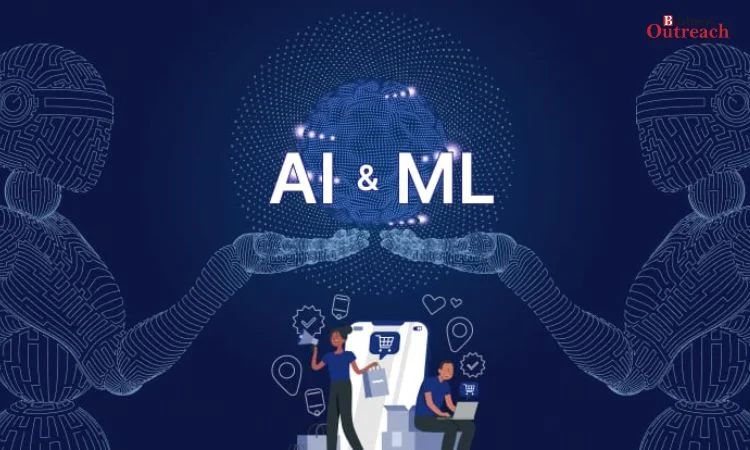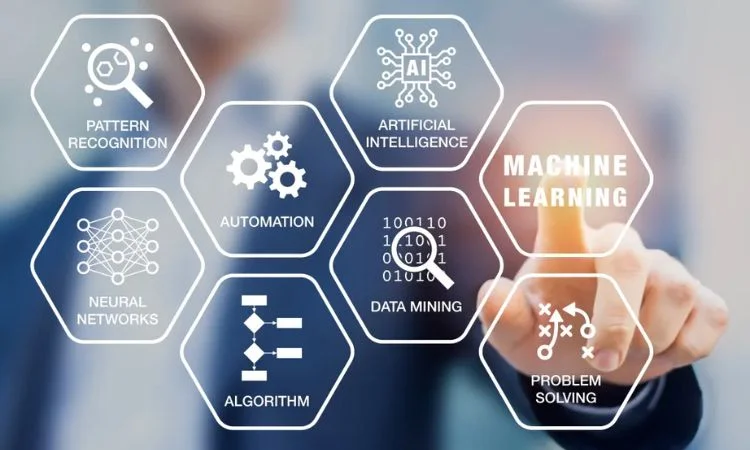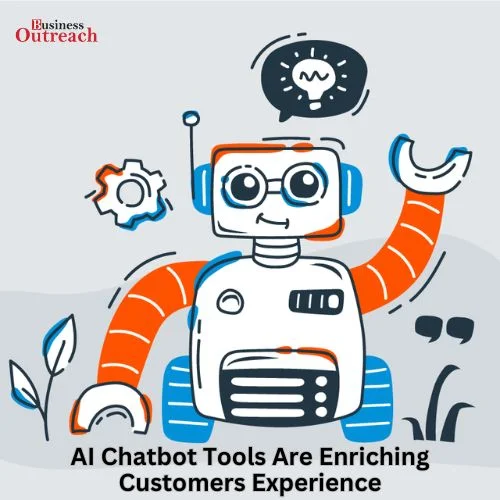Artificial Intelligence(AI) and Machine Learning(ML) are two aspects that create active trends in the contemporary information business environment and changing the rules of competition. These new technologies have opened a whole new world of possibilities where organizations are now able to optimise operation, improve decisions, and increase innovation.
| Table of Contents |
| Overview |
| The Powerful Synergy: AI and ML in Business |
| Personalization |
| Predictive Analytics |
| Intelligent Chatbots |
| Automated Processes and Solutions in Operations |
| Advanced Marketing and Sales Techniques |
| Product Development and Innovation |
| Intelligent Decision Making and Risk Management |
| Real-World Examples of AI and ML Applications |
| Benefits of Using AI in Business |
| Organizational Uses of AI in Various Business Areas |
| Challenges and Ethical Considerations in AI Implementation |
| Conclusion |

Source: Magneto IT Solutions
Overview
As we imminent business use cases of Artificial Intelligence & Machine Learning, it is important to have a basic understanding of Artificial Intelligence & Machine Learning. Artificial Intelligence is defined as designing computer systems that are able to complete intelligent tasks, which include learning, problem solving, and decision making in a similar way as human beings.
Artificial Intelligence as a field comprises many subfields of which Machine Learning is a subfield that is concerned with the use of algorithms and statistical models to make the computer systems perform a specific task better with experience and data without being programmed to do so.
The Powerful Synergy: Artificial Intelligence and Machine Learning in Business
Integration of technologies into business has been very effective because it has introduced competency levels into business worth inheriting. These technologies, in their combined form, have the capability of revolutionalizing almost every function within an organization, extending from customer relations and sales to procurement and new product design.
Improving the customer experience:
Artificial Intelligence and Machine Learning plays a significant role in a business, which includes personalization, analytics, and intelligent chatbots for the business-customer relationship.
Predictive Analytics: It is possible to predict the tendencies, preferences, and potential risks of customer churn using data analysis through Machine Learning models taking into account the customer interactions, recent and past purchases, and general online behaviour. With these insights, businesses can consider customer needs and their opportunities to proactively improve particular offers as well as develop retention strategies.
Intelligent Chatbots: With the use of NLP and Machine Learning, intelligent chatbots can help in hours and days of customer service operations, answering basic questions, and even product/service suggestions based on the client’s likes. These virtual assistants help to improve the customer experience through giving answers at once and relieve people from receiving more complicated requests or questions.
Automated Processes and Solutions in Operation
Inventory Management: While making demands and supply estimates, Machine Learning models can use historical sales data, market trends, and the factors that control the supply chain, thus avoiding overstocking and stock out levels. This not only reduces cost but also increases customer ult by making their needed products available.
Demand Forecasting: In this paper we will look into how the use of Machine Learning algorithms can enable great demand forecasting by comparing the forecasted data over time using past data sales patterns, market trends, and other external factors. This allows corporate institutions to forecast on production, to properly distribute its resources, and to reduce unwanted incidences of wastage.
Route Optimization: Due to the implementation of Artificial Intelligence and Machine Learning integration, it can enable the software to capture the real-time data of traffic, position of the vehicles, and the limitations of delivery to choose the best route that can consume less fuel, cut down on transportation costs, and ensure timely delivery.
Advanced Marketing And Sales Techniques With The Help Of Artificial Intelligence And Machine Learning

source: The Daily MBA
Targeted Advertising: By applying Machine Learning algorithms on customers’ databases, audiences can be segmented and potential buyers of specific products can be singled out, and advertising messages that would have the greatest impact can be delivered through different media to reach their target consumers.
Content Personalization: By using the collected data, Machine Learning models can understand customers’ interests, their behaviour while browsing or using applications, and their preferences, helping to provide customised content, recommendations, and offers that will better appeal to the target audience and therefore enhance engagement and the chances of conversion.
Marketing Attribution: With the help of Machine Learning algorithms, businesses can track the interaction with the customers and transference of leads from the different marketing channels and touchpoints and then rely on these figures to measure the effectiveness of their marketing activities.
Sentiment Analysis: With the help of AI and Machine Learning tools, it is possible to understand the overall sentiment with a brand or product, as well as to monitor conversations in social media and ratings of companies and products. Immediate application of this knowledge can be made on product development, brand promotional activities and even customer relations.
Product Development and Innovation
Product Recommendations: The possibility of using customer data, their preferences, and purchasing behaviour to identify useful additional products or features that would meet customer needs and reflect their wants helps create good customer satisfaction and trust.
Rapid Prototyping and Testing: Artificial Intelligence and Machine Learning technologies allow businesses to effectively crack a wider range of potential product designs and materials, as well as the various performance scenarios that may ensue, thus accelerating the rate at which new ideas can be developed and tested prior to large-scale production or marketing investments being made.
Automated Design Optimization: The application of Machine Learning techniques can help to enhance designs since it enables analysis of numerous factors such as customer feedback, market trends, and design limitations to achieve optimal product design of performance, elegance, and functionality.
Intelligent Decision Making and Risk Management Decisions making
Predictive Analytics: Having learnt a lot from previous data, it becomes easier for the business to determine the likely outcomes of a certain decision, the trends within a specific sector, or periods of high risk, hence enabling early risk detection and management.
Fraud Detection: Analysing the records expressed in terms of transactions, user application, and other relevant factors, the application of the Machine Learning models becomes useful for preventing the fraudulent activities and the Machine Learning models become useful for the businesses to prevent their operations.
Financial Forecasting: Machine Learning algorithms can also work on data of various natures and categorise these in question to produce timely accurate forecasts regarding financial markets and trends, finally helping organisations to invest wisely, to allocate resources much more effectively, and also to avoid any number of financial perils in their wake.
Here are a few real-world examples that illustrate the transformative power of these technologies:
Amazon’s Recommendation System: A great application of Machine Learning in e-commerce sites is Amazon’s recommendation system that studies the customers’ pattern to recommend appropriate products to them, thus, ensuring high sales and customer satisfaction.
Netflix’s Content Personalization: Streaming services such as Netflix currently employ the use of Machine Learning algorithms to learn from the viewers’ patterns, past history and any real time data to recommend content to the users thus enhancing engagements and minimizing malfunction and churning off users.
Uber’s Dynamic Pricing: Machine learning models at Uber helps real-time supply and demand for the services, pricing is not fixed and can be changed according to the availability of the cars and drivers which in turn improves efficiency.
Automated Fraud Detection: Insurance companies utilize Machine Learning models to identify potential fraudsters while retail outlets use similar models to minimize credit card fraud so that businesses and consumers do not lose their money and shoppers do not get robbed again.
Predictive Maintenance in Manufacturing: They apply the technologies of Artificial Intelligence and Machine Learning to track the working condition of equipment and materials that are to be replaced or repaired as well as the schedule of production to minimize the time during which the materials and equipment don’t work while enhancing productivity.
Benefits of Using Artificial Intelligence in Business

Source: Forbes
Integrating artificial intelligence in an organization has some advantages throughout all the departments and spheres of the organization’s activities. According to Noémie Ellezam, the Chief Digital Strategy Officer of Société Générale, a bank from France that ranks sixth in Europe Artificial Intelligence is an accelerator of their digital strategy with the Significance of Impacts Extending Across Their Business Verticals.
Here Below are the some benefits of using Artificial Intelligence in business productivity:
Intense Customer Interaction and Interaction
Artificial Intelligence customer services interfaces like chatbots, callbots and virtual customer assistants are changing the face of customers’ interactions with business enterprises in a way that makes the interactions more efficient.
Automation and Increased Efficiency
It can complete some clerical work such as data entry, the recording of meetings, and the generation of repeated /routine contents, so the human resources can focus more on important things.
The use of product recommendation, customised alerts and messages
When considering consumers, Artificial Intelligence can sort through the data and use them to determine preferences and even buying tendencies among customers. This can enable businesses to make accurate suggestions, promotions, offers and offers that are customized to meet the needs of their clients.
Organizational uses of Artificial Intelligence in Various Business Area
Accounting
An Artificial Intelligence- powered accounting tool may generate cash flow statements, expense categorisation, tax and payroll suggestions, and financial forecasting. It corrects the data entry mistakes, facilitates the identification of transacting patterns related to fraud and duplication and last but not least, it highlights cost modifications for you.
Content Generation
The General Artificial Intelligence would help to write, research and edit, and even perform multimedia production tasks. It helps in marketing communication initiatives, business forms and documents, language translation and transcription as well as code tooling and generation, therefore affording corporate organisations access to these specialised skills at reasonable rates.
Customer Service and Support
Chatbots and callbots assist in providing customer relations support in handling the large volumes of questions to enable human operators to attend to complicated issues. These applications can include analyzing emotions of customers and transcribing calls for the betterment of the service experience and methods.
Cybersecurity
Cybersecurity solutions developed with the use of Artificial Intelligence technologies perform the analysis of the activity of the system, the recognition of potential threats, and the prevention of cyber threats. This makes it easier for security crews to evaluate potential risks and also to counter threats once they are recognized.
Information Technology (IT) Operations
Artificial Intelligence in IT operations, and it implies enhanced data handling and management and IT infrastructure maintenance. This allows for monitoring performance, resource management and data backup amongst other tasks which offer further analysis of system performance issues and failures.
As it can be seen from the above sections, the elements of Pattern Analysis within the field of financial analysis, trading, and fraud detection can be summarised as follows:
The aspects of Financial departments are being empowered with the help of Artificial Intelligence technology, data analysis, algorithms in fraud examination, and utilizing automated compliance software. Through processing huge volumes of data, Artificial Intelligence assists the investors to manage their portfolios as well as to identify fraudulent schemes.
Human Resources
Artificial Intelligence applies to the repetitive and time-consuming numerous activities in the HR functional domain for employees, allowances or payroll, recruiting, onboarding, etc.
Sales and Marketing
Some of the applications of Artificial Intelligence include the sales force automation, customer relation management, email marketing, social media, and advertising automation.
Artificial Intelligence generative writing improves marketing:
it applies Adweek’s scripts, social networks’ posts, articles, and design products.
Supply Chain and Logistics
Artificial Intelligence enhances supply chain and logistics business by providing better forecasting, inventory control, and managing manual activities. This case enables resources division, processes timing, and also handling possible interferences in operation.
Challenges and Ethical Considerations in Artificial Intelligence Implementation
On October 7, 2023, President Joe Biden signed the “Executive Order on the Safe, Secure, and Trustworthy Development Use of Artificial Intelligence” as Artificial Intelligence has capacities to be either beneficial and dangerous. The proper use of Artificial Intelligence can also solve present crucial problems as well as develop well-being, efficiency, and creativity.
Ethical and Privacy Concerns
Artificial Intelligence integration becomes problematic in business applications due to a variety of ethical and privacy concerns. Artificial Intelligence governance must be upgraded to meet new standards regarding the rights of individuals and the protection of their data, particularly in cases where Artificial Intelligence commit mistakes, bring bias and discrimination.
Identifying Skills Shortages and Workforce Change
Specifically, Artificial Intelligence can help overcome shortage of skills by new-dimensional tools such as coding and writing instruments. However, it does leave new opportunities for skill gaps as technology is changing faster than ever before. Artificial Intelligence adoption practices also have numerous challenges regarding training and adaptation of workers and organizational systems.
Conclusion
In conclusion, Artificial Intelligence (AI) and Machine Learning (ML) are revolutionizing the contemporary business environment, reshaping competition, and offering unprecedented opportunities for optimization, decision-making, and innovation. A fundamental understanding of these technologies is crucial as their applications span across various business functions, from enhancing customer experience and automating processes to advanced marketing strategies and intelligent decision-making.















